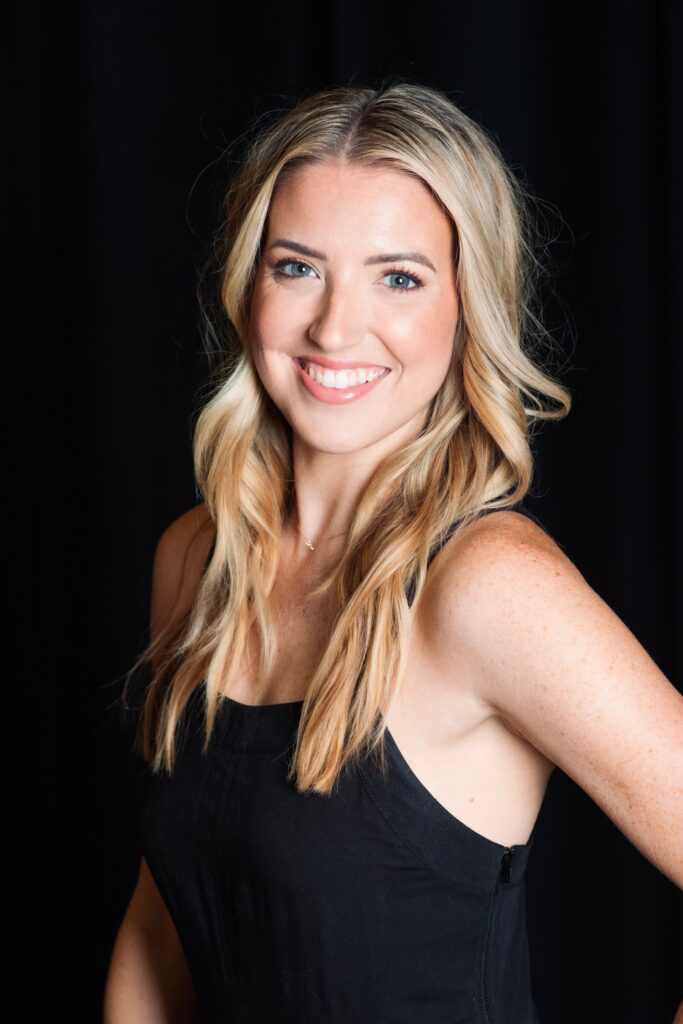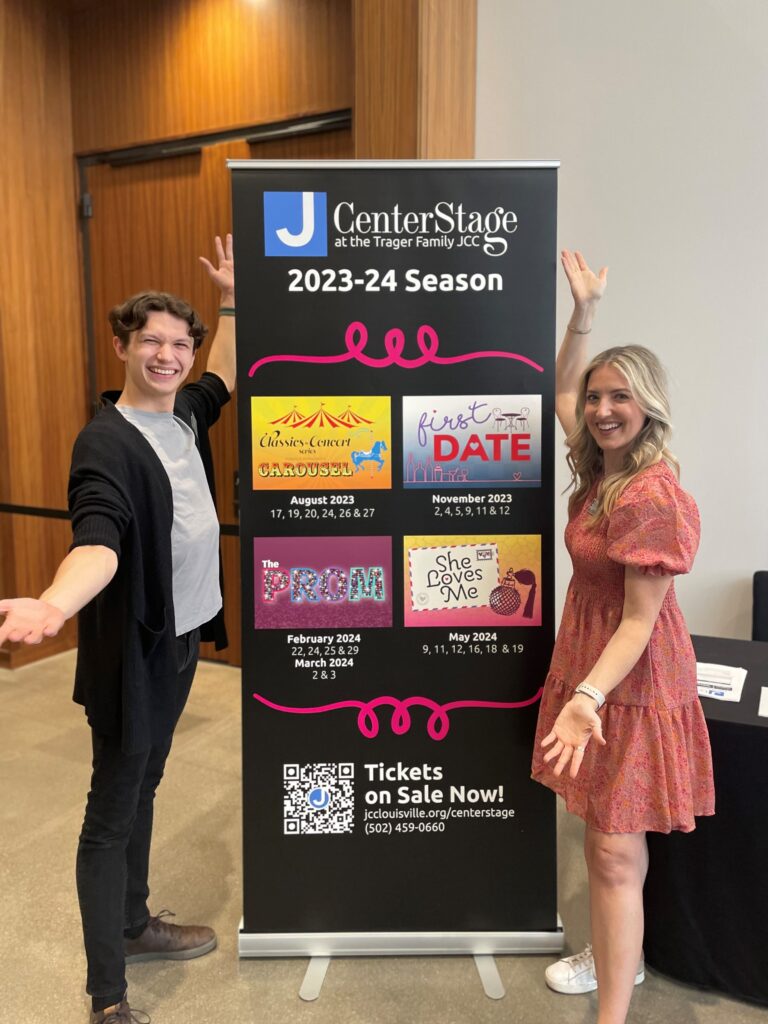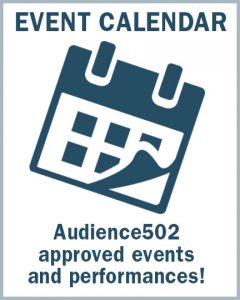Erin Silliman – Producing Director
CenterStage at the Trager Family JCC
By G. Douglas Dreisbach
 CenterStage at the Trager Family Jewish Community Center is one of the oldest continuously operating theater groups in the region, known for its high-quality productions of musicals and plays. The theater company moved to JCC’s new, state-of-the-art facility in April 2022.
CenterStage at the Trager Family Jewish Community Center is one of the oldest continuously operating theater groups in the region, known for its high-quality productions of musicals and plays. The theater company moved to JCC’s new, state-of-the-art facility in April 2022.
Established in 1913, CenterStage enriches Louisville’s cultural landscape by showcasing local talent and fostering a love for the performing arts, while celebrating diverse stories and perspectives. Each season consists of four to five productions with six to seven performances each. This year’s line-up includes The Music Man, Bent and You’re a Good Man Charlie Brown, that were both in 2024, and upcoming productions include Disney’s High School Musical (Feb. 20, 22, 23 & 27; March 1, 2, 6, 8 & 9) and 9 to 5: The Musical (May 8, 10, 11, 15, 17 & 18).
We caught up with CenterStage Producing Director, Erin Silliman, to get the inside scoop about what’s going on with the season and what makes it such a special place for theater productions in Louisville.
Listen to the full interview below:
Doug Dreisbach: Thank you for your time today! CenterStage typically produces five to six productions per year. What is your cycle there?
Erin Silliman: Our main season consists of four large-scale musicals, and this year we actually departed a little bit from that and incorporated a play into our mainstage timeline, which was a wonderful addition. We wanted to offer something different.
DD: Coming up in February, you’ve got Disney’s High School Musical, and then in May the 9 to 5 musical. When you put together the programming, how do you manage the overall world for choreographing, getting actors and actresses, and where do those students and actors come from? Can you give us an overview of what that looks like?
ES: Every year, we have our season audition and do kind of a full cattle call, if you will. We do a full season audition in the summertime. Last summer, we welcomed over 150 people who auditioned, and they were from our community. Everybody is from Louisville or from the surrounding area, and they’re wanting to do community theater. We hold our auditions and simultaneously, we are putting together our production team, which does include our guest directors, if we have those, our choreographers, music directors, our kid musicians, our technicians, lighting designer, you name it. That’s when we’re putting everything together.
 DD: It’s all held at the beautiful new multimillion-dollar Trager Family Jewish Community Center, right on Dutchman’s Lane, a very convenient location to get in and out of. How’s the new facility been?
DD: It’s all held at the beautiful new multimillion-dollar Trager Family Jewish Community Center, right on Dutchman’s Lane, a very convenient location to get in and out of. How’s the new facility been?
ES: It’s been wonderful, yes, our new home. We have the same address, but it’s a completely different building. Everyone knows the JCC, built in the mid-1900s, and we were so fortunate to be able to move into this wonderful new building, and it’s accommodated our programming, expanded it, really, so that we can provide more programming for our community, so it’s been a wonderful move.
DD: As the producing director, what are some of your primary roles and responsibilities from an annual perspective with the whole season, and then more of a day-to-day task list?
ES: Any producing director or artistic director probably can identify with this — it’s that every day is different, which is my favorite part about this position, about this job, and really this privilege to do within our community. From an annual perspective, yes, it starts with the budgeting for the entire season, putting together our production list and analyzing, “Is that what our community desires? Is that what our community needs? And how can we make it the best it can be with the resources that we have, and again with budgeting, with the relationship that we have with local artists and designers?” And then, from there, from a day-to-day perspective, it is getting to interact with our production team, making sure that we are prepared when we bring the actors in and our musicians in, and then on the user end of it, thinking about our audiences and making sure that our theater is welcoming and ready for all the people who are going to be visiting the facility.
DD: Since 2018, what have you seen change, other than the home stage and auditorium, at CenterStage? And what are some of those accomplishments that you’re proud of since you’ve been there?
ES: When I started, I was the educational program director and got to work with all the young people that came to our building for our program. And as a classroom teacher before that — that is a passion of mine — is working with young performers and young technicians alike. Personally, what I’ve seen, the biggest change, is moving into this position as director. And having gotten to work with incredible directors before me, I had great examples that came before me that I got to learn from and then grow from, as well.
Something that I’m most proud of, I guess, in that transition — of course, I can’t go without saying we went through a global pandemic in that time, and so not only were we contending with reopening our theater after a global pandemic, having changed live theater everywhere and live performing arts, but we were also moving into our new building.
It was a contentious time for everybody, and those of us working in the performing arts, it really changed the work that we do. And I’m most proud of the fact that we were able to reopen and reopen thoughtfully and intentionally, and I’m so thankful to be working with a team around me — that includes our marketing team here at the JCC, our IT team, our building management team, as well as my colleague, Logan McNeely. We worked so hard to open up thoughtfully, and not bite off more than we can chew, but honoring our past with looking towards our future. And that’s what I’m most proud of, is to continue that over 100-year tradition of CenterStage.
DD: Well, that’s exciting. The oldest community theater in Kentucky? Is that right?
ES: Yes. I try not to boast too much about that, but it really is such an incredible badge of honor to boast that CenterStage, or iterations of CenterStage, actually started at the Heritage Theatre here in the JCC, and then morphed into what we now know as CenterStage. We’ve been serving our community of Louisville and surrounding areas with performing arts for over 200 years — sorry, 100 years! Wow, that would have been a big accomplishment!
DD: Speaking of other cities and maybe some more of the youth or family theater that you’ve seen around in other communities, other cities, have you seen anything that you really want to try to implement here in Louisville at CenterStage?
ES: Some of my favorite experiences here in Louisville have been — I guess we could say nontraditional, but I don’t even like to say that, because what is traditional now, when it comes to theater? I think people are exploring ways to engage their audiences in really creative ways, more abstract ways, specifically more immersive experiences. And I really am engaged with, or I am inspired by, that as an audience member myself, and so naturally that is something that I want to think more about. How can we provide those, for lack of a better word, nontraditional experiences for our audiences that take theater in a new way, so people — both old theatergoers and new theatergoers alike.
DD: Overall, Louisville’s a pretty arts-centric kind of a community. Where do you feel like we are as a city, not only in the arts, but more of theater arts and theatergoers, as you just mentioned? Where do you feel like that’s been, say, in the last 10 or 15 years? Where are we now? And what do you think the future holds for theater patrons?
ES: I think, as I said earlier, the pandemic really changed how we’re approaching performing arts. And I think, at least myself, along with many other directors in the city — it feels more collaborative these days. It feels like everyone is supporting each other a little bit more authentically, and we’re genuinely curious and excited about what each other is doing, and I think that that brings a whole other energy to our work, knowing that my colleague across the street at the other theater company is there to support me as a director, and there to support our audiences and get people just in front of live theater again. That’s the goal of all of ours, which is so exciting. There’s room for everybody at the table when it comes to community arts. And I think that has been a big shift over the last 10 years, at least in my experience, and what better realm, what better environment, to be creative in, than an environment that is supportive with your colleagues?
DD: For somebody who’s never been to a CenterStage production, can you give us a little reason why maybe they should give it a try, and what they can expect?
ES: Yes, well, our program is — we’ve always boasted high-quality performing arts, and I still tout that. That is something that we aim for, and it’s high quality because of the people that come through our doors, both on the production side of things and our audiences having high expectations. And we want them to come through the door with high expectations, because we all want a joyous experience when we walk into a theater. And we strive to make it affordable and accessible for everybody in our community. As we said earlier, we are centrally located, which gives us that advantage, and also we strive to have affordable pricing for those people in our community, of course, always aiming to be vigilant to what our community needs and what it desires out of performing arts. But if people haven’t given CenterStage a try, I hope that our tradition of high-quality, affordable and accessible theater speaks to them, and that they’re willing to come on over to Dutchmans Lane.
DD: Fantastic. And how can they get tickets? Do they buy them at the door or go to your website, or how does that work?
ES: Yes, they can go to our — well, both, really. They can go to our website, JewishLouisville.org, and on there, they’ll look for CenterStage under the Arts and Ideas department. Or they can call our box office at (502) 238-2797. We are excited, like I said, to get anyone through our doors. Everyone deserves the arts, and they deserve to feel like they belong and they can belong here.
DD: Fantastic. Well, we appreciate you taking a few minutes with us today. Is there anything you’d like to add before we wrap it up?
ES: Well, you know, High School Musical and 9 to 5 are going to be great shows, so I’d love to see everyone here for that.
For tickets and more information, visit jewishlouisville.org
CLICK HERE for more Audience Spotlights with Leaders of the Louisville Arts Groups





